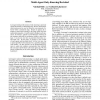Free Online Productivity Tools
i2Speak
i2Symbol
i2OCR
iTex2Img
iWeb2Print
iWeb2Shot
i2Type
iPdf2Split
iPdf2Merge
i2Bopomofo
i2Arabic
i2Style
i2Image
i2PDF
iLatex2Rtf
Sci2ools
114
click to vote
CORR
2000
Springer
2000
Springer
Multi-Agent Only Knowing
Levesque introduced the notion of only-knowing to precisely capture the beliefs of a knowledge base. He also showed how only-knowing can be used to formalize non-monotonic behavior within a monotonic logic. Despite its appeal, all attempts to extend only-knowing to the many agent case have undesirable properties. A belief model by Halpern and Lakemeyer, for instance, appeals to proof-theoretic constructs in the semantics and needs to axiomatize validity as part of the logic. It is also not clear how to generalize their ideas to a first-order case. In this paper, we propose a new account of multi-agent only-knowing which, for the first time, has a natural possible-world semantics for a quantified language with equality. We then provide, for the propositional fragment, a sound and complete axiomatization that faithfully lifts Levesque's proof theory to the many agent case. We also discuss comparisons to the earlier approach by Halpern and Lakemeyer.
Related Content
| Added | 17 Dec 2010 |
| Updated | 17 Dec 2010 |
| Type | Journal |
| Year | 2000 |
| Where | CORR |
| Authors | Joseph Y. Halpern, Gerhard Lakemeyer |
Comments (0)

